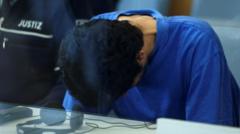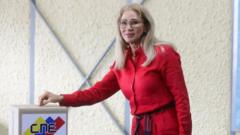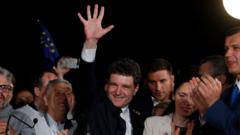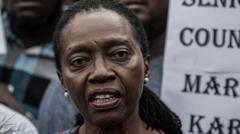*The Dutch government crumbled following Geert Wilders' unexpected withdrawal, putting a spotlight on deep-seated immigration conflicts and raising questions about future electoral stability.*
**Far-Right Leader's Exit Triggers Dutch Government Downfall**

**Far-Right Leader's Exit Triggers Dutch Government Downfall**
*Geert Wilders' departure from the coalition unveils political turmoil and escalating tensions over migration issues.*
The Dutch political landscape has been rocked by the sudden collapse of the ruling government, initiated by the dramatic exit of Geert Wilders, leader of the far-right Freedom Party (PVV). The turbulence stemmed from a fierce dispute over migration policies, culminating in Prime Minister Dick Schoof's resignation, which he announced during an emergency cabinet meeting.
In his addresses to the public, Schoof labeled Wilders' decision to exit the governing coalition as both “irresponsible” and “unnecessary.” Reflecting on the brief coalition's troubled timeline—barely surviving a year—Schoof lamented the abrupt turn of events after Wilders demanded measures that included further restrictions on asylum applications and a halt to building reception centers for migrants.
Rather than any genuine negotiation, Wilders' departure came swiftly after only a minute into the coalition meeting, a maneuver he signaled with a terse message on social media stating, "No signature for our asylum plans. PVV leaves the coalition." His demands had largely been out of step with previous agreements and faced skepticism during prior coalition discussions due to concerns over legality and feasibility.
The coalition, composed of the PVV, the conservative-liberal VVD, the Farmers' Citizen Movement (BBB), and the centrist New Social Contract, was fraught with tension from the outset. Dilan Yesilgoz of VVD condemned Wilders' actions as “super irresponsible,” while BBB's deputy Prime Minister Mona Keijzer accused him of being a traitor to the Netherlands.
Wilders, however, remains undeterred, proclaiming his intention to seize the role of prime minister and bolster the PVV's standing in future elections. Economically, the fallout appears limited for now, with analysts suggesting the government had not enacted substantial policies during its brief term.
As political volatility swells across Europe, particularly concerning migration and rising living costs, recent polls indicate a close race between far-right factions and Green-Left counterparts. With a NATO summit on the horizon, ministers will operate in a caretaker capacity until new elections are scheduled, likely later this autumn.
Amidst accusations of prioritizing personal ambition over national stability, Wilders' controversial decision could further diminish his appeal as a coalition partner in forthcoming electoral efforts. His previous control over migration policies may provide ammunition for his election campaign, though skepticism looms large regarding the effectiveness of such a strategy.





















